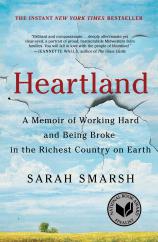Reading Group Guide
Discussion Questions
Heartland: A Memoir of Working Hard and Being Broke in the Richest Country on Earth

1. At the beginning of the memoir, Smarsh writes that, as a child, “I heard a voice unlike the ones in my house or on the news that told me my place in the world.” What did this other voice tell her? What did the people in her house and on the news say about her?
2. Smarsh is the product of generations of teen pregnancy on her mother’s side. She writes that she was like a penny in a purse, “not worth much, according to the economy, but kept in production.” How did this legacy of teenage pregnancy affect her family’s social and economic mobility?
3. Smarsh and her brother were each born just weeks before Reagan won an election, and his economic policies had a tremendous impact on her childhood. Can you describe what that impact looked like?
4. Smarsh describes an incident in which she, as a toddler, pulled a chest of drawers onto herself, forcing her barely postpartum mother to injure herself lifting it up. Smarsh’s father was at work. How does this accident demonstrate the dangers of rural poverty and the fault lines in Jeannie and Nick’s relationship? Are the two related?
5. There were many, many car wrecks in the author’s life and in the lives of members of her family. Why do you think that is?
6. Teresa, Smarsh’s paternal grandmother, had untreated “woman problems” in her youth, according to Nick. What kinds of problems might he have been referring to? How was life in rural Kansas different for women than it was for their farmer husbands?
7. Smarsh writes, “When I was well into adulthood, the United States developed the notion that a dividing line of class and geography separated two essentially different kinds of people.” Do you think that’s true? How does Smarsh straddle that line?
8. Betty often said that homeless people should “get a job,” even though she and her family struggled economically --- and even though she often gave money to those same people. How do you think her values were affected by the class system?
9. Do you believe, as Smarsh writes, that “in America...the house is the ultimate status symbol, and ownership is a source of economic pride”? What do you think the family’s transience meant to Nick, Jeannie, Smarsh and her brother?
10. How did Bob’s newspaper job and middle-class stability affect the family’s economic situation?
11. Many of the women in Smarsh’s family endured physical violence at the hands of their boyfriends, husbands and fathers. In what ways does gendered violence inhibit economic stability?
12. Smarsh writes that the women in her family had an “old wisdom” that had more to do with intuition than knowledge or education. Where do you see this in action in the lives of female characters?
13. Consider the specific reality of Smarsh’s life as a high-achieving high school student. What pushed her to excel?
14. What social realities did Smarsh meet in college? How was her life different from those of her fellow students, and how was it similar?
15. Smarsh argues that “this country has failed its children.” Do you agree? How does her story demonstrate that, or fail to?
Heartland: A Memoir of Working Hard and Being Broke in the Richest Country on Earth
- Publication Date: September 3, 2019
- Genres: Memoir, Nonfiction, Sociology
- Paperback: 320 pages
- Publisher: Scribner
- ISBN-10: 1501133101
- ISBN-13: 9781501133107







